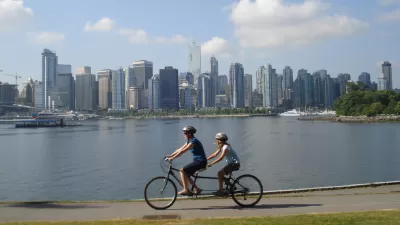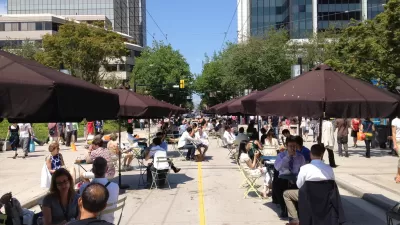Urbanist Brent Toderian does not begrudge NIMBYs; he values them. In an interview with David Roberts of Vox, he explains that the problem doesn't lie with development opponents as much as it does with the decision-makers.

Urbanist Brent Toderian, who helped make Vancouver, Canada famous in smart growth circles as its urban planner for six years, now works as a city planning consultant. He shares his tips to overcoming objections to increased density with David Roberts, who writes about energy and climate change for Vox.
I work all over the world, and there are NIMBYs everywhere. Density is never easy. Change is never easy. We have a bias towards the status quo and we tend to weigh loss more heavily than gain. That is human nature.
Density-phobia is not endemic to urban areas either, as the developer of a four-story affordable senior apartment building in the small city of Prospect, Kentucky outside Louisville, will testify (see Planetizen post, June 15).
To me, NIMBY is not a pejorative. It means people are saying, “that thing — we don’t want it in our backyard, in our neighborhood.” There’s nothing inherently bad about that. Sometimes it’s a reasonable point! ... There are things we don’t want in our backyard, and when you combine that with human nature, almost anything in your backyard that you don’t currently have is going to be a challenge.
So I don’t begrudge NIMBYs. I value them. I listen carefully and I learn what they’re afraid of, why they say no. Often I will learn how to do yes better and address their fears, or at least mitigate them.
Residents who oppose the "increased traffic, the height and density" of the 198-unit Prospect Cove, for example, are not necessarily the problem, explains Toderian. Rather, he blames the decision-makers who can be overcome by the opponents' fears.
I think we need to train our politicians on how to work with the NIMBY mindset and do the right thing in its context. Doing a “yes,” but a better yes, educated by NIMBY fear.
Toderian elaborates on how planning commissioners and city council members need to respond to NIMBY fears, particularly when there's a basis for those fears, and relates them to his experience in Vancouver.
Vancouver has a track record of delivering density in a pretty good way, so we can have a different conversation about change and density and height.
Toderian also has advice for YIMBYs. They should advocate for QIMBY: Quality In My Back Yard. He goes on to define the three components to "density done well."
The dialog in Vox with Toderian continues in:
- "Lessons on urbanism from a Vancouver veteran" and
- "Young families typically leave cities for the suburbs. Here’s how to keep them downtown."
Hat tip to John Hartz via Sierra Club Transportation Forum.
FULL STORY: Making cities more dense always sparks resistance. Here’s how to overcome it.

Trump Administration Could Effectively End Housing Voucher Program
Federal officials are eyeing major cuts to the Section 8 program that helps millions of low-income households pay rent.

Planetizen Federal Action Tracker
A weekly monitor of how Trump’s orders and actions are impacting planners and planning in America.

The 120 Year Old Tiny Home Villages That Sheltered San Francisco’s Earthquake Refugees
More than a century ago, San Francisco mobilized to house thousands of residents displaced by the 1906 earthquake. Could their strategy offer a model for the present?

HSR Reaches Key Settlement in Northern California City
The state’s high-speed rail authority reached an agreement with Millbrae, a key city on the train’s proposed route to San Francisco.

Washington State Legislature Passes Parking Reform Bill
A bill that would limit parking requirements for new developments is headed to the governor’s desk.

Missouri Law Would Ban Protections for Housing Voucher Users
A state law seeks to overturn source-of-income discrimination bans passed by several Missouri cities.
Urban Design for Planners 1: Software Tools
This six-course series explores essential urban design concepts using open source software and equips planners with the tools they need to participate fully in the urban design process.
Planning for Universal Design
Learn the tools for implementing Universal Design in planning regulations.
Ada County Highway District
Clanton & Associates, Inc.
Jessamine County Fiscal Court
Institute for Housing and Urban Development Studies (IHS)
City of Grandview
Harvard GSD Executive Education
Toledo-Lucas County Plan Commissions
Salt Lake City
NYU Wagner Graduate School of Public Service





























